7 start with S start with S
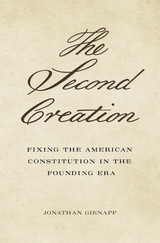
A stunning revision of our founding document’s evolving history that forces us to confront anew the question that animated the founders so long ago: What is our Constitution?
Americans widely believe that the United States Constitution was created when it was drafted in 1787 and ratified in 1788. But in a shrewd rereading of the Founding era, Jonathan Gienapp upends this long-held assumption, recovering the unknown story of American constitutional creation in the decade after its adoption—a story with explosive implications for current debates over constitutional originalism and interpretation.
When the Constitution first appeared, it was shrouded in uncertainty. Not only was its meaning unclear, but so too was its essential nature. Was the American Constitution a written text, or something else? Was it a legal text? Was it finished or unfinished? What rules would guide its interpretation? Who would adjudicate competing readings? As political leaders put the Constitution to work, none of these questions had answers. Through vigorous debates they confronted the document’s uncertainty, and—over time—how these leaders imagined the Constitution radically changed. They had begun trying to fix, or resolve, an imperfect document, but they ended up fixing, or cementing, a very particular notion of the Constitution as a distinctively textual and historical artifact circumscribed in space and time. This means that some of the Constitution’s most definitive characteristics, ones which are often treated as innate, were only added later and were thus contingent and optional.
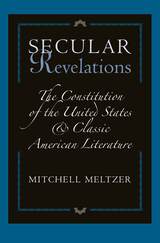
The United States Constitution, battleground of a politically bifurcated nation, and sponsor of that nation's now threatened cultural unity, is a quintessentially political document. Americans' representatives swear loyalty to it, and her soldiers die for it. Yet no one has ever seriously considered the formative influence this document, so central a force for all Americans, has had on American cultural life. Now, in this ambitious book, Mitchell Meltzer has for the first time demonstrated the extent to which the Constitution is both source and inspiration for America's greatest literary masterworks.
Retelling the history of the Constitution's formation, Meltzer explains how the peculiarly paradoxical form of the Constitution, its "secular revelation," underwent a literary rebirth after the passing of the Founders' generation, and issued in what is strangest and most characteristic in America's classic literature. By combining the secular with the revealed, a Constitutional poetics results that gives rise, in both politics and literature, to the formation of more perfect unions.
Offering powerful new perspectives on Lincoln, Emerson, Whitman, and Melville, Meltzer reveals how the Constitution counterintuitively generated such oft-noted tendencies as these writers' penchant for self-contradiction, their willingness to court radical discontinuity, and their intensely conflicted, romance-directed fictions.
Secular Revelations presents the Constitution in a new role, the inspiration of a great national literature.

The separation of powers along functional lines--legislative, executive, and judicial--has been a core concept of American constitutionalism ever since the Revolution. As noted constitutional law scholar Gerhard Casper points out in this collection of essays, barren assertions of the importance of keeping the powers separate do not capture the complexity of the task when it is seen as separating power flowing from a single source--the people. Popular sovereignty did not underlie earlier versions of the separation of powers doctrine.
Casper vividly illustrates some of the challenges faced by Washington, Adams, Hamilton, Madison, Gallatin, Jefferson, and many others in Congress and the executive branch as they guided the young nation, setting precedents for future generations. He discusses areas such as congressional-executive relations, foreign affairs, appropriations, and the Judiciary Act of 1789 from the separation of powers vantage point.
The picture of our government's formative years that emerges here, of a rich and overlapping understanding of responsibilities and authority, runs counter to rigid, syllogistic views. Separating Power gives us a clear portrait of the issues of separation of power in the founding period, as well as suggesting that in modern times we should be reluctant to tie separation of powers notions to their own procrustean bed.
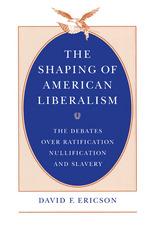
Focusing on three critical debates in American history—the debate between Anti-Federalists and Federalists over the ratification of the Constitution; the debate between the national republicans and the states-rights republicans over the nullification of the tariff; and the Lincoln-Douglas debates over slavery and pluralist democracy—Ericson shows that republicanism, rather than being opposed to liberalism, is in fact an offshoot of it. His descriptions of republicanism and pluralism represent the poles of an evolving tradition of liberal ideas in America: the former championing the claims of the public sphere, general welfare, and civic virtue; the latter protecting the rights of the individual to liberty, property, and privacy.
Republicanism and pluralism are therefore more properly understood as two sets of competing ideas that evolved from common roots. Ericson concludes that although republican themes persist in American politics, the profound transformations brought about by the Civil War made the ascendancy of pluralism virtually inevitable.
This highly original discussion of the relation between liberalism and republicanism—the central concern of much of the recent scholarship in American political thought—will be important reading for those interested in American politics, history, and culture.
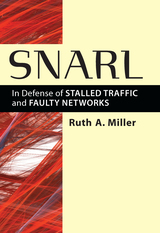
Ruth A. Miller excavates a centuries-old history of nonhuman and nonbiological constitutional engagement and outlines a robust mechanical democracy that challenges existing theories of liberal and human political participation. Drawing on an eclectic set of legal, political, and automotive texts from France, Turkey, and the United States, she proposes a radical mechanical re-articulation of three of the most basic principles of democracy: vitality, mobility, and liberty.
Rather than defending a grand theory of materialist or posthumanist politics, or addressing abstract concepts or “things” writ large, Miller invites readers into a self-contained history of constitutionalism situated in a focused discussion of automobile traffic congestion in Paris, Istanbul, and Boston. Within the mechanical public sphere created by automotive space, Snarl finds a model of democratic politics that transforms our most fundamental assumptions about the nature, and constitutional potential, of life, movement, and freedom.
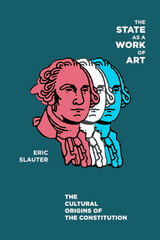
The founding of the United States after the American Revolution was so deliberate, so inspired, and so monumental in scope that the key actors considered this new government to be a work of art framed from natural rights. Recognizing the artificial nature of the state, these early politicians believed the culture of a people should inform the development of their governing rules and bodies. Eric Slauter explores these central ideas in this extensive and novel account of the origins and meanings of the Constitution of the United States. Slauter uncovers the hidden cultural histories upon which the document rests, highlights the voices of ordinary people, and considers how the artifice of the state was challenged in its effort to sustain inalienable natural rights alongside slavery and to achieve political secularization at a moment of growing religious expression.
A complement to classic studies of the Constitution’s economic, ideological, and political origins, The State as a Work of Art sheds new light on the origins of the Constitution and on ongoing debates over its interpretation.
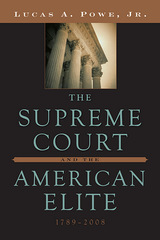
“The Supreme Court follows the election returns,” the fictional Mr. Dooley observed a hundred years ago. And for all our ideals and dreams of a disinterested judiciary, above the political fray, it seems Mr. Dooley was right. In this engaging—and disturbing—book, a leading historian of the Court reveals the close fit between its decisions and the nation’s politics.
The story begins with the creation of the Constitution and ends with the June 2008 decisions on the rights of detainees at Guantánamo Bay. Rendering crisp (and often controversial) judgments on key decisions from Marbury v. Madison to the War on Terror, Lucas Powe shows how virtually every major Supreme Court ruling, however deftly framed in constitutional terms, suited the wishes of the most powerful politicians of the time. This history reflects a changing Court, from the country’s early struggles over commerce and transportation to the torturous justifications of slavery before the Civil War, to a post–New Deal interest in ending segregation, controlling criminal procedure, and addressing knotty questions arising from the Cold War. Through all of this the Court emerges as part of a ruling regime, doing its best to implement the regime’s policies.
Drawing on more than four decades of thinking about the Supreme Court and its role in the American political system, this book offers a new, clear, and troubling perspective on American jurisprudence, politics, and history.
READERS
Browse our collection.
PUBLISHERS
See BiblioVault's publisher services.
STUDENT SERVICES
Files for college accessibility offices.
UChicago Accessibility Resources
home | accessibility | search | about | contact us
BiblioVault ® 2001 - 2024
The University of Chicago Press









